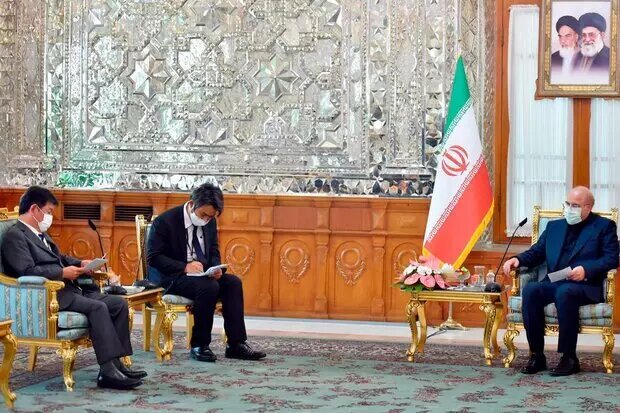Resolution of complicated issues entails more talks, Japan FM says of JCPOA

TEHRAN – Noting that Tokyo is closely following the Vienna talks aimed to revive the 2015 nuclear deal officially called the JCPOA, Japanese Foreign Minister Toshimitsu Motegi suggested on Sunday that resolution of “very complicated issues” entails “more negotiations”.
Japan’s chief diplomat made the remarks in a meeting with Iranian Parliament speaker Mohammad Baqer Qalibaf.
In addition, Motegi said, Japan is closely monitoring developments in West Asia.
The Japanese foreign minister added, “On the other hand we insist the JCPOA sides to commit themselves to the document and continue (nuclear deal) talks.”
The Japanese Foreign Ministry said on Sunday that Motegi urged Iran's new President Ebrahim Raisi to return the multilateral deal over Tehran's nuclear program, the Kyodo news agency reported.
The U.S. under Donald Trump quit the JCPOA in May 218 and introduced the harshest sanctions against Iran in violation of international law. The JCPOA was endorsed by UN Security Council Resolution 2231.
One year after the Trump administration unilaterally abrogated the multilateral deal, Iran started to gradually reduce bans on its nuclear activities. Iran took such a step after the European parties to the JCPOA failed to honor their commitments. At the time Iran announced if the Europeans compensate Iran for the sanctions, it will reverse its decision.
The Trump administration intended to force Iran to forego its nuclear rights stipulated in the JCPOA. His sanctions measures on Iran, which he arrogantly called “maximum pressure”, failed to force Iran to rewrite the text of the nuclear agreement. Iran adopted “maximum resistance” against maximum pressure.
However, the remaining parties to the JCPOA started talks in Vienna in April to bring the U.S. back to the deal as President Biden greenlighted his administration’s willingness to rejoin the international nuclear deal. Six rounds of talks were held until June 20. Though the sides made significant progresses to revive the JCPOA, the Biden administration has set new conditions, linking the JCPOA to Iran’s defensive missile program and its influence in the West Asia region.
In 2019, former Japanese Prime Minister Shinzo Abe visited Tehran to convey a message from Trump to Leader of the Islamic Revolution Ayatollah Ali Khamenei. However, the Leader said Trump is not worthy of an exchange of messages.
Japan’s foreign minister also stressed the importance of improving trade and economic cooperation between Tehran and Tokyo.
Motegi also said his country is willing to expand talks with the Iranian parliament (Majlis) and expressed hope that in the coming days the heads of parliamentary friendship groups hold virtual talks.
He also referred to donation of Coronavirus vaccine by Japan to Iran, saying Japan’s humanitarian help to Iran in the midst of the Covid-19 pandemic “shows the depth of friendly relations between Iran and Japan.”
Recently, Japan donated some 3 million doses of AstraZeneca vaccine to Iran, which has suffered the worst virus outbreak in West Asia.
Qalibaf calls for roadmap cooperation with Japan
During the talks, the Iranian parliament speaker pointed to 90 years of diplomatic relations between Iran and Japan, saying this shows that the history of relations between Iran and Japan is long and deep-rooted.
Qalibaf also called for crafting a long-term roadmap for cooperation between Iran and Japan.
“Relations between the two countries should be defined within a framework of long-term roadmap,” especially in the areas of environment protection and natural disasters, the speaker remarked.
Qalibaf also said delivery of humanitarian aid between the two countries is a “symbol of friendship between the people of Iran and Japan.”
Elsewhere in his remarks, Qalibaf said Iranians have a “positive view” toward Japan.
The two sides also discussed bilateral ties as well as regional and global developments.
Iranian speaker urges Japan to take serious steps to unfreeze Iranian assets
At the meeting, Iran’s parliament speaker also said it is necessary that Japan take serious steps to unfreeze Iran’s assets blocked in the country’s banks, especially under the present circumstances that Iran is grappling with the deadly coronavirus pandemic, Press TV reported.
Criticizing Japan’s measure in freezing Iranian assets in the country under U.S. pressure, Qalibaf said, “We expect the government of Japan to act seriously to unfreeze Iran’s assets, especially in order to ease the fight against the coronavirus pandemic.”
In a meeting with the Japanese foreign minister earlier on Sunday, President Ebrahim Raeisi sharply criticized Japan for refusing to release the frozen assets.
Qalibaf also pointed to Washington’s unilateral move to pull out of the 2015 nuclear deal, saying, “By leaving the JCPOA, this country stepped on all forms of multilateral and international interactions and caused illegal sanctions to be imposed on our nation and government.”
He added, “Americans must live up to their commitments. The U.S. acts of obstruction have made it impossible [for Iran] to even purchase medicine during the coronavirus pandemic, and we expect Japan, as a peace-loving country, to show serious reaction to this issue.”
Iran has been fighting back against one of the deadliest Covid-19 outbreaks in the world, with the harsh U.S. sanctions significantly hampering efforts to contain the spread of the virus.
Leave a Comment